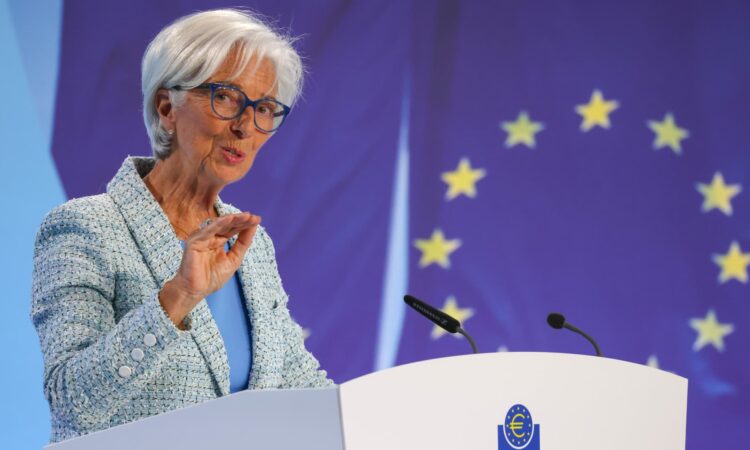
Christine Lagarde, president of the European Central Bank (ECB), at a rates decision news conference in Frankfurt, Germany, on Thursday, June 6, 2024. The European Central Bank delivered the interest-rate reduction it’s been flagging for months moving away from a record high but stopped short of indicating more may follow.
Bloomberg | Bloomberg | Getty Images
The European Central Bank on Thursday confirmed a widely anticipated reduction in interest rates at its meeting, despite lingering inflationary pressures in the 20-nation euro zone.
It takes the central bank’s key rate to 3.75%, down from a record 4% where it has been since September 2023.
“Based on an updated assessment of the inflation outlook, the dynamics of underlying inflation and the strength of monetary policy transmission, it is now appropriate to moderate the degree of monetary policy restriction after nine months of holding rates steady,” the ECB Governing Council said in a statement.
In updated macroeconomic projections that will be closely analyzed by investors, ECB staff raised their annual average headline inflation outlook for 2024 to 2.5% from 2.3% previously.
Staff likewise lifted their 2025 forecast to 2.2% from 2%. The 2026 projection remained at 1.9%.
Money markets had fully priced in the 25 basis point move lower at the June gathering. It is the first cut since September 2019, when the deposit facility was in negative territory.
Markets have only fully priced one further reduction this year, but economists polled by Reuters last week forecast two more cuts taking place over the period.
A follow-up cut at the ECB’s next meeting in July was already unlikely, but has been all but ruled out by the latest figures, Dean Turner, chief euro zone economist at UBS Global Wealth Management, told CNBC.
“The slight upgrade to the inflation forecast was to be expected, inflation has been printing a little bit hotter than markets were expecting, but in terms of the timing of the next cut I’d still be looking to September,” Turner said.
Though the ECB began hiking interest rates later, the June cut puts it ahead of the U.S. Federal Reserve on its march lower, as the world’s largest central bank remains stymied by the rate of U.S. inflation.
Canada on Wednesday became the first G7 nation to cut interest rates in the current cycle, while Sweden‘s and Switzerland‘s central banks already announced their own rate reductions this year.






